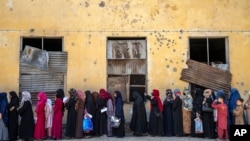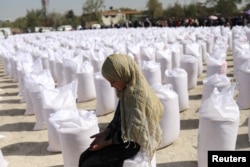Lack of donor funding is the No. 1 problem hindering humanitarian response efforts in Afghanistan, where 28 million people are in dire need of assistance, aid experts say.
Funding levels have dropped significantly since de facto Taliban authorities banned Afghan women from working for the United Nations and international NGOs, a move strongly condemned by donor countries.
"The biggest challenge actually for our organization [is] the fact that we are currently facing funding cuts that affect our ability to continue delivering on the ground," said Melissa Cornet, a humanitarian advocacy adviser with CARE, an international aid organization.
Of the $3.2 billion funding goal the United Nations has set for Afghanistan this year, donors have provided only $477.7 million, or 14.8%, as of July 12.
"NGOs have proven that we can work, that we can find workarounds, and that despite restrictions, we are able to reach more and more people. But what is holding us back right now is not our ability to find ways to reach these communities. It is fundamentally a lack of funding," said Samira Sayed-Rahman, the International Rescue Committee's policy and communications director.
Speaking at an event at the United States Institute of Peace on Wednesday, Cornet and Sayed-Rahman said the lack of funding was hurting Afghan NGOs and women-led organizations more than their international partners. Local NGOs implement about 70% of the U.N. projects and programs in Afghanistan.
"It's really like a double punishment," said Cornet. "On the one hand, we have to deal with the constraints imposed by the de facto authorities, and on the others, we are not able to access new funding … and this is having a huge impact on the ability to support Afghan women and girls."
Several donors have said they remain committed to assisting the people of Afghanistan while at the same time have strongly condemned the Taliban, blaming them for creating the crisis.
The U.S. Department of State has previously told VOA: "The U.S. government remains committed to helping the Afghan people through the humanitarian and economic crisis that the Taliban created and have exacerbated with the discriminatory NGO edict." A spokesperson replied in written comments.
Earlier this year, in an interview with Afghanistan's TOLOnews, the U.S. special representative for Afghanistan, Thomas West, said, "We also see needs elsewhere in the world," explaining that emergencies in Ukraine, Syria and Turkey have created extraordinary needs.
"And, frankly, for fiscal-related reasons, we have fewer humanitarian dollars to go around and for all of these reasons, I am worried that there will be a lower contribution in the year ahead."
In response to the Taliban's ban, the U.N. and other aid agencies have allowed their local female employees to work from home while those involved in the health sector are permitted to go to health facilities.
Engagement with Taliban
Despite ruling Afghanistan for nearly two years, the Taliban regime has failed to earn formal recognition from any country and many of its leaders face travel sanctions.
Many world leaders have said the Taliban must lift all restrictions on women's work and education and form an inclusive government before seeking recognition as a legitimate government of Afghanistan.
The U.S. government, which negotiated and signed a peace agreement with the Taliban in 2020, has nearly ceased diplomatic engagement with the group.
"I believe in engagement with Taliban," said Khaled Payenda, a former acting finance minister of Afghanistan, while speaking at the same USIP event.
"You need to engage them, to keep the pressure constantly on them to do the tough work of sitting down with them and making sure some of the programs go ahead as you intend."
Global crisis
The dire situation in Afghanistan is one piece of a global humanitarian crisis that has pushed more than 122 million people into hunger over the past four years.
"Over 122 million more people are facing hunger in the world since 2019 due to the pandemic and repeated weather shocks and conflicts, including the war in Ukraine," five U.N. specialized agencies said in a new report on Wednesday.
Some 735 million people face hunger around the world, according to the U.N.
Afghanistan, Ukraine, Yemen, Syria, Haiti, Burkina Faso, South Sudan, Congo, Ethiopia and Somalia are the 10 worst humanitarian crises in 2023, making up 90% of the global population in need of urgent humanitarian assistance, the IRC says.







